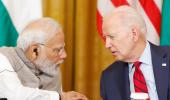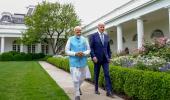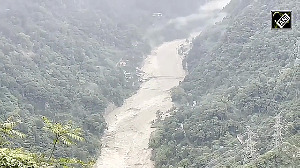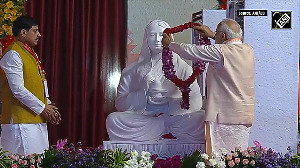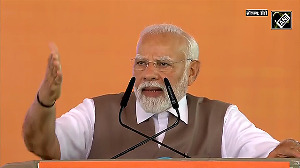'Having India as a credible deterrent vis-a-vis Chinese ambitions in the Indian Ocean and South Asian region is a desirable short-term outcome.'

"Symbolically, both countries were able to demonstrate to China, a common enemy, the strength of the Indo-US partnership," says Manjari Chatterjee Miller, Senior Fellow for India, Pakistan and South Asia at the Council on Foreign Relations in Washington, DC.
The Council on Foreign Relations is an independent, nonpartisan think-tank and publisher dedicated to being a resource to help better understand the world and foreign policy choices facing the United States and other countries.
Dr Miller is also a research associate in the Contemporary South Asian Studies Programme at the Oxford School of Global and Area Studies at the University of Oxford.
She is an expert on India, China, South Asia, and rising powers and has authored two books book Why Nations Rise: Narratives and the Path to Great Power, which was shortlisted for the 2022 Hedley Bull Prize in International Relations, and Wronged by Empire: Post-Imperial Ideology and Foreign Policy in India and China.
Miller is also the co-editor of the Routledge Handbook of China-India Relations.
"The Indo-US relationship has completely transformed over the last decade. The State visit was another outcome of that transformation, and the deliverables that came out of the visit simply confirm that this bilateral relationship has now entered a phase that was unimaginable just a few years ago," Dr Miller tells Rediff.com's Archana Masih in an e-mail interview.
What have been the key accomplishments of this State visit?
The visit was been successful for both India and the United States, symbolically and materially. Symbolically, both countries were able to demonstrate to China, a common enemy, the strength of the partnership.
Moreover, by showering Mr Modi with honours such as a State dinner, and an invitation to address Congress, the United States showed that as far as it is concerned Mr Modi's reputation has been rehabilitated.
Materially, there were several important deals, particularly in defence and technology that were joint accomplishments. For example, the GE deal, which will enable India to manufacture engines for its fighter jets, the purchase of Predator drones by the Indian ministry of defence and India agreeing to join the US-led Artemis Accords on space exploration, will all bolster the strategic partnership.

In terms of the gains made in defence and technology cooperation -- purchase of drones, the announcement to make jet engines jointly, also Tesla's likelihood of opening a factory in India -- are such deals emblems of a redefinition of the India-US relationship?
Yes completely. The GE deal is subject to Congressional, approval, but the fact that the Biden administration has offered it at all is a really big step in the relationship.
The US is very particular about the sharing of military technology and selective about its partners.

White House officials have termed bilateral ties with India as the 'most consequential' relationship for America.
In what ways is the future of India-US relations going to be different from here on?
It is already different. The relationship has completely transformed over the last decade. The State visit was another outcome of that transformation, and the deliverables that came out of the visit simply confirm that this bilateral relationship has now entered a phase that was unimaginable just a few years ago.

Kurt Campbell, President Biden's chief strategist on Asia, has said that bilateral ties with India have perhaps deepened more than any other country.
In view of the challenge thrown by the war in Ukraine and the threat from China in the Pacific, what do you think America really expects from India?
I think the US is trying to temper its expectations of India, and not suffer the disappointment of high expectations.
But that being said, having India as a credible deterrent vis-a-vis Chinese ambitions in the Indian Ocean and South Asian region is a desirable short-term outcome.
Feature Presentation: Aslam Hunani/Rediff.com
